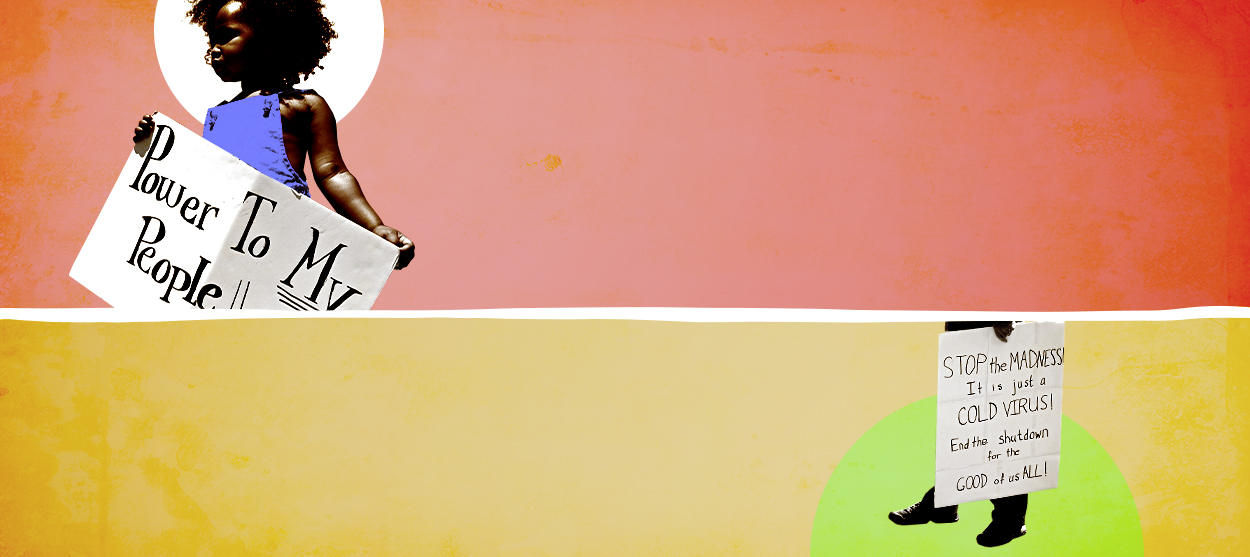The best of America, the worst of America
As we open a new calendar page, we have choices to make about which version of America we want to enact in 2021 and beyond


A free daily email with the biggest news stories of the day – and the best features from TheWeek.com
You are now subscribed
Your newsletter sign-up was successful
How do you sum up a year like this one? The past 12 months have thrown so many curveballs that it's become cliché to try and enumerate them all. Among my friends and loved ones, "2020" has become a kind of shorthand for baffling, absurd, heartbreaking, enraging. I started the year by proclaiming how exhausted I was. I don't think any of us had any idea how exhausted we were about to become.
As I look back on 2020, I find myself thinking of it as a study in contrasts. This year has brought out both the best and the worst of America. In the absence of a decisive, science-based national response to the COVID-19 pandemic, we have been largely left on our own to navigate challenges many of us never expected to face in our lifetimes. As a country, we are reaping the consequences of a political, economic, and cultural machinery built on cruelty and conquest. But at the same time, individually and collectively, Americans have stepped up in extraordinary ways to protect our communities and reshape our immediate future.
As we open a new calendar page, we have choices to make about which version of America we want to enact in 2021 and beyond. We must look to the best and most humane versions of ourselves as we decide. It's a matter of literal life and death.
The Week
Escape your echo chamber. Get the facts behind the news, plus analysis from multiple perspectives.

Sign up for The Week's Free Newsletters
From our morning news briefing to a weekly Good News Newsletter, get the best of The Week delivered directly to your inbox.
From our morning news briefing to a weekly Good News Newsletter, get the best of The Week delivered directly to your inbox.
Let's start with the ugly stuff. The American mythos is rooted in a toxic mix of white supremacy and rugged individualism: a sense that the white-privileged among us are the sole masters of our own destiny. We are steeped in a culture that insists freedom means behaving exactly as we please, and that everything around us is ours for the taking. Even at the best of times, that attitude sits very poorly with our responsibility towards each other, and towards the land on which we live.
With the arrival of COVID-19, it's become abundantly clear that our health and safety — our very lives — are intimately bound up with the behavior of those around us. And Americans' rugged individualism is fundamentally incompatible with the self-sacrificing behaviors that have been proven to slow the spread of viral illnesses like COVID-19 — wearing masks, keeping physically distanced, avoiding prolonged indoor contact. Unfortunately the reigning political regime has consistently played into this narrative, casting mask mandates and shelter-in-place orders as somehow un-American, and couching its push for states to resume "business as usual" in the language of liberty.
And then, of course, there's our health-care system. COVID-19 is battering America's hospitals and clinics beyond their breaking point, and putting those who get sick at the mercy of a system that routinely bankrupts people after serious illness. But the rot the virus is exposing has been spreading in this country for a long time. Here, too, American individualism rears its head: We are taught that our health is our responsibility alone; that it can and should be managed through sheer force of will; and that it's our fault if we are too old or sick or disabled to survive without halfway decent medical care. White supremacy tags along too, insisting that the communities of color who have borne the brunt of the pandemic are to blame for being vulnerable to illness in the first place.
So far, so ugly. But there is reason for hope too.
A free daily email with the biggest news stories of the day – and the best features from TheWeek.com
Even as our national leaders have left a void in America's COVID-19 response, individuals have stepped up to fill a sliver of it. For those of us who know better than to embrace individualism at all costs, 2020 has been a year for us to learn how to support each other and affirm the great bond we share. I know so many people who have voluntarily upended their entire daily lives to avoid spreading the virus; who have started mutual aid funds and raised millions of dollars to support their neighbors; who are finding creative and unexpected ways to stay connected with friends and loved ones while physically apart.
2020 was also a year where America's history of protest and activism came to the forefront. The Black Lives Matter protests during the summer sent a loud-and-clear signal to the powers that be that Americans were not going to back down in the face of profound cruelty. And the fact that the U.S. presidential election turned out as it did is a testament to the phenomenal efforts of activists — particularly Black, Indigenous, and other activists of color — to overcome decades of ruthless, systematic voter suppression and get voters from marginalized communities to the polls.
Not every American embraced generosity and interconnectedness, justice and science this year. But plenty of us did. And now it's time to carry that forward into 2021. We have to embrace tenacity in the face of cruelty, and reject the most destructive aspects of our American identities in favor of acknowledging our interdependence and dismantling our prejudices.
2020 is not done with us yet. Its legacy will reverberate far beyond Dec. 31. But we have a chance to redefine how America moves forward from this strange, destabilizing year. Let's look to the best of our American instincts in 2021, and keep chipping away at the systems that would have us believe we can't be both American and humane.
Want more essential commentary and analysis like this delivered straight to your inbox? Sign up for The Week's "Today's best articles" newsletter here.
Zoe Fenson is a freelance writer based in the San Francisco Bay Area. Her writing has appeared in Longreads, Narratively, The New Republic, and elsewhere. When she's not writing, you'll find her doing crossword puzzles in cocktail bars or playing fetch with her cat.
-
 5 cinematic cartoons about Bezos betting big on 'Melania'
5 cinematic cartoons about Bezos betting big on 'Melania'Cartoons Artists take on a girlboss, a fetching newspaper, and more
-
 The fall of the generals: China’s military purge
The fall of the generals: China’s military purgeIn the Spotlight Xi Jinping’s extraordinary removal of senior general proves that no-one is safe from anti-corruption drive that has investigated millions
-
 Why the Gorton and Denton by-election is a ‘Frankenstein’s monster’
Why the Gorton and Denton by-election is a ‘Frankenstein’s monster’Talking Point Reform and the Greens have the Labour seat in their sights, but the constituency’s complex demographics make messaging tricky
-
 The billionaires’ wealth tax: a catastrophe for California?
The billionaires’ wealth tax: a catastrophe for California?Talking Point Peter Thiel and Larry Page preparing to change state residency
-
 Bari Weiss’ ‘60 Minutes’ scandal is about more than one report
Bari Weiss’ ‘60 Minutes’ scandal is about more than one reportIN THE SPOTLIGHT By blocking an approved segment on a controversial prison holding US deportees in El Salvador, the editor-in-chief of CBS News has become the main story
-
 Has Zohran Mamdani shown the Democrats how to win again?
Has Zohran Mamdani shown the Democrats how to win again?Today’s Big Question New York City mayoral election touted as victory for left-wing populists but moderate centrist wins elsewhere present more complex path for Democratic Party
-
 Millions turn out for anti-Trump ‘No Kings’ rallies
Millions turn out for anti-Trump ‘No Kings’ ralliesSpeed Read An estimated 7 million people participated, 2 million more than at the first ‘No Kings’ protest in June
-
 Ghislaine Maxwell: angling for a Trump pardon
Ghislaine Maxwell: angling for a Trump pardonTalking Point Convicted sex trafficker's testimony could shed new light on president's links to Jeffrey Epstein
-
 The last words and final moments of 40 presidents
The last words and final moments of 40 presidentsThe Explainer Some are eloquent quotes worthy of the holders of the highest office in the nation, and others... aren't
-
 The JFK files: the truth at last?
The JFK files: the truth at last?In The Spotlight More than 64,000 previously classified documents relating the 1963 assassination of John F. Kennedy have been released by the Trump administration
-
 'Seriously, not literally': how should the world take Donald Trump?
'Seriously, not literally': how should the world take Donald Trump?Today's big question White House rhetoric and reality look likely to become increasingly blurred
